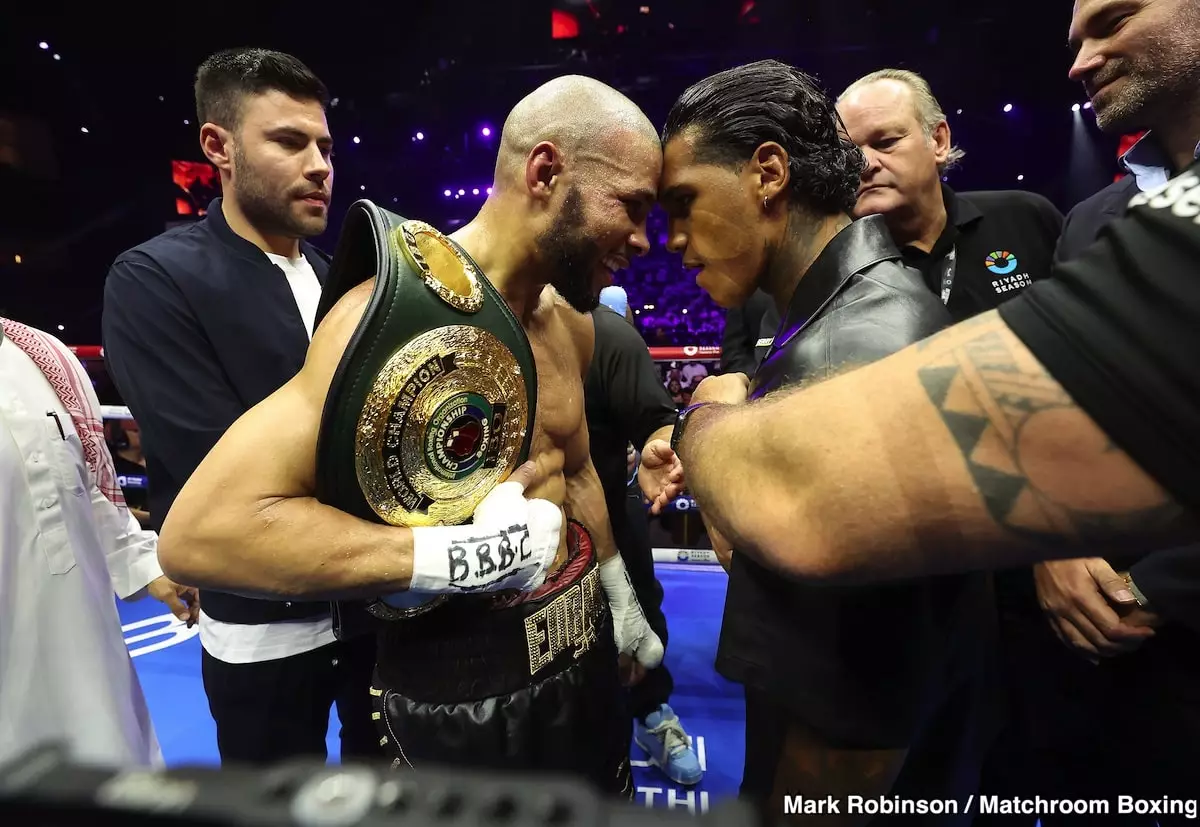The world of boxing has always been filled with hype and expectation, yet not every event resonates beyond its home turf. The upcoming fight featuring Chris Eubank Jr. and Conor Benn at Tottenham Hotspur Stadium on April 26th embodies this reality perfectly. Marketed as a significant encounter, it seems more a display of nostalgia and familial legacy than a clash of titans. Both boxers, sons of legendary fighters, are poised to battle it out for local bragging rights rather than any significant title or global claim.
For avid American boxing fans, this bout may appear as just another underwhelming showcase that plays heavily on the lineage of the competitors rather than on their professional merits. Indeed, it begs the question: what happens when the allure of a ‘grudge match’ is stripped down to its bare essentials? We’re left with two fighters looking to step out of their fathers’ shadows, but in doing so, they may merely reinforce them.
Chris Eubank Jr. brings a wealth of experience to the ring. While he has garnered a reputation for being on the fringe of elite status, his previous encounters have seen him face formidable opponents like James DeGale, Arthur Abraham, and George Groves. These outings present an intriguing portfolio that many feel favors him going into this fight. Distinguished boxing commentator Carl Froch, himself a former champion, has weighed in with a cautious endorsement, suggesting that Eubank Jr.’s size and background give him the upper hand.
On the other hand, Conor Benn’s trajectory through boxing has been marred by controversies, particularly regarding failed drug tests. This has, in essence, overshadowed his ability to earn respect in the ring. While his brawling style may appeal to fans of power-packed exchanges, it’s questionable whether he can genuinely challenge Eubank Jr. or simply raise his profile through this high-profile matchup.
The debate about their respective legacies unfolds an intriguing dialogue about boxing in modern culture. Are fans drawn only to athletic prowess and not the narratives behind the fighters, or are they just itching for conflicts that can captivate their emotions? Eubank and Benn’s confrontational history has been marred by delays and altercations, yet their reputations remain ambiguous, leading to skepticism about this much-anticipated bout.
Froch’s input into the conversation does more than just favor Eubank Jr. It points to a larger issue present in contemporary boxing: the fixation on family names and the pressure they bring. Benn has been characterized by Froch as underwhelming in his accomplishments, curbing the excitement traditionally associated with a “grudge match.”
The potential problem lies within the expectation for UK fans to support a fight that may be rich in narrative but lacks the essential characteristics that define elite matchups. A fight devoid of global stakes risks alienating an international audience already bombarded with more influential bouts—events that matter beyond mere bragging rights.
The undercard features an array of familiar British faces in bouts that promise little more than routine entertainment. Promises of memorable encounters like Anthony Yarde versus Lyndon Arthur hardly incite excitement when past encounters have illustrated a lack of drama. While these domestic rivalries have their own merit, they contribute to a perception that boxing in the UK is facing an identity crisis—relying heavily on past legacies rather than fostering new tales of glory.
American boxing aficionados may find themselves questioning the relevance of such an event. With bouts involving internationally recognized talent, including undisputed champions, the Eubank-Benn fight may appear as a filler in a rich tapestry of boxing history rather than a pivotal moment.
The Eubank Jr. versus Benn clash is indeed a reflection of a broader predicament in boxing—one that underscores local loyalty over substance. While British crowds may revel in their homegrown rivalries, the potential for this bout to impact the global boxing narrative appears bleak. Ultimately, if boxing is to retain its status as a celebrated sport, it must transcend regional limitations and produce spectacles that can captivate audiences worldwide, instead of merely feeding into a narrative steeped in familial tradition. As this fight unfolds, only time will reveal if it is a true turning point or merely another contentious chapter in boxing’s storied annals.


Leave a Reply